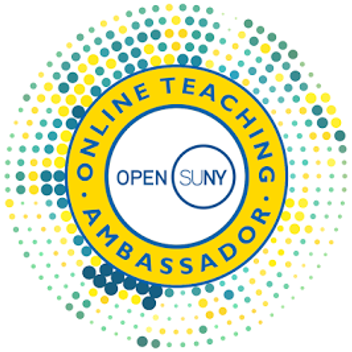Open SUNY Online Teaching Ambassador 2016 – Sullivan: Arthur E. Riegal

Arthur E. Riegal, is a professor in the Division of Business and Social Sciences at SUNY Sullivan. Has worked for 30 years in Academia: SUNY Learning Network online instructor (13 years – Developed 9 Business courses for online delivery.), Facilities Coordinator of Culinary Arts Department, Bursar, Director of Culinary Arts Dept. (Developed Pastry Arts Program), Interim Dean of Students, Division Chair of Health, Social and Behavioral Sciences (Psychology and Social Work Programs added), Professor – Division of Business and Culinary Arts, Professor – Division of Social Sciences and Sustainability Studies, Chancellor’s award for Faculty Service. MBA School of Management at SUNY Binghamton; BS New York University; AAS SUNY Sullivan.
As one of the first in a cohort of three SUNY Sullivan professors trained to teach online with the advent of the SUNY Learning Network (now Open SUNY) I have made enough mistakes and had enough successes to learn a few lessons:
Engage whenever you can: Remember they don’t know who you are if they have never met you face to face.
Apologize when you make a mistake. Forget to uncheck that “make available to student” box or make an error in the calendar? Don’t let them think it’s their fault just because you are the teacher and can blame technology. Announce it right away. It humanizes the far away keyboard cowboy you’ve become and will actually go further in making them more accountable for their mistakes as well.
Since we are in a rural area and broad band is not always particularly fast, instead of skype, facetime or other platforms that misbehave I utilize the AGB method to tutor those students having a really rough time with my Econ courses.
AGB? Oh yeah….Alexander Graham Bell…great guy. They hear your voice. They hear your concern. They hear patience as you restate the issue over and over again in different ways while looking at the same screen they are. The concept of distance learning should not be relegated to a computer screen. I offer it to all but I find those who take me up on the offer are generally the non-traditional student not raised with a portable computer in their hands.
Once again it’s all about that body language, NOT.
There’s a drawback of not being able to stand in front of them waxing forth passionately about elasticity curves and negative externalities while being able to immediately read that deer in the headlights look.
It means that HOW I write something is just as important as WHAT I write, particularly if I am giving criticism or responding to a rant of frustration. Yes, even if I need to use emoticons to invoke more emotion (my colleagues in the English department just fainted).
I love getting to know my students online. Sometimes they tell me more about themselves than they would ever volunteer in a traditional seated classroom. Many times they are more open with their opinions in my graded discussions than I would ever hear face to face. I have learned that assessing critical thinking is easier in an online graded discussion than it is in the classroom since every post they make can be pondered, researched and appropriately rewarded.
I would encourage anyone who is ready, to pick a course, ditch your face to face ways and think about what you would like to see as an online student. Rewrite your course and give it a go.
It certainly is not for everyone but then…nothing is.















































